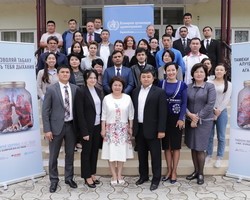Central Asian countries to further strengthen tobacco control

WHO
Scaling up political commitment is key to strengthening tobacco control and implementing the WHO Framework Convention on Tobacco Control (WHO FCTC) in central Asian countries. Experts from these countries made this scale-up part of their tobacco control plans at the recent Tobacco Control Leadership Programme in Issyk-Kul, Kyrgyzstan.
Representatives of ministries of health along with partners from Kyrgyzstan, Kazakhstan, Turkmenistan and Uzbekistan participated in the Programme on 11–13 June 2019. It aimed to enable participants to further strengthen tobacco control in central Asian countries in line with the WHO FCTC.
Participants described the major challenges they face in strengthening tobacco control and identified the key factors that influence the legislative decision-making process. WHO experts presented case studies from Georgia, the Republic of Moldova and the United Kingdom on the legislative process for advancing tobacco control and enforcement mechanisms. They also shared experiences of arranging mass campaigns to pass tobacco control laws.
Participants examined the economic and health-care benefits of tobacco control, and the economics of tobacco production, use and marketing and the associated costs in the WHO European Region. They also discussed the role of networking and coalition building in influencing the legislative process.
Another topic of discussion was trade and tobacco control in the context of plain packaging, and how successful pictorial health warnings and plain packaging are in the Region. Participants stressed that regional surveillance and the use of data are crucial for better policy-making.
At the end of the Programme, participants shared their draft leadership action plans for applying strategic tobacco control measures, and agreed on next steps towards full implementation of the WHO FCTC. These include scaling up political commitment for tobacco control in general and for full WHO FCTC implementation in the central Asian countries.
Dr Nazira Artykova, WHO Representative in Kyrgyzstan, remarked: “The Leadership Programme provides all participants with a good opportunity to consolidate the power to further strengthen the implementation of tobacco control law.”



